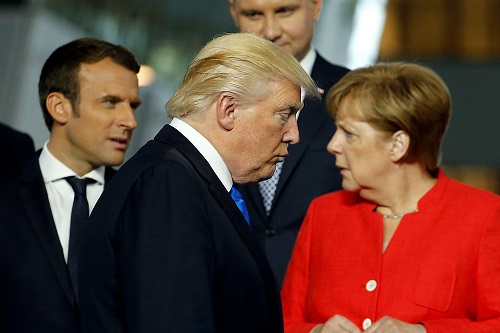Reuters photo
By
Tom Arms
One of the great fears of the Cold War Era was Transatlantic decoupling. That is the possibility that the link between economically and militarily powerful America and a Europe struggling to recover from two world wars would be broken.
Without its across the sea protector, Western Europe was an easy target for the Russian military machine and the US would lose its closest political ally and most lucrative market.
We are no longer in the Cold War. Moscow is not threatening to impose communism on the world.
But Putin has retained Russia’s authoritarian tendencies, and replaced the underlying political philosophy of international communism with nationalism. The Russian leader has also retained his country’s national paranoia and the belief that the best defence is a good offense.
So Europe still needs America. Or does it?
This is a question which Europe—in the form of the member states of the EU—is asking itself. And the answers range from ‘yes, we do’ to a resounding ‘it’s time to move on.’
The British have taken the lead in the ‘we need America’ camp. They were the driving force behind the creation of NATO in 1949, and the wrecking force behind French attempts in the 1950s to create a more independent European defence arm.
The Transatlantic link suited British foreign policy. The special US-UK relationship gave them a pivotal foot in both camps, especially after they signed up to the European experiment in 1973. But now Britain is leaving Europe and as it moves away it leaves open the door to the French.
Hampered by unruly trade unionists, navel-gazing philosophers and an anachronistic agricultural system, the French have never achieved the economic power that would give them the dominant position in Europe. They are, however, the pre-eminent continental military power in Western Europe. But what good is that as long as American conventional and nuclear umbrella—held up by Britain—dominates the scene.
Germany, of course, is frightened of the long shadow of its militarist history, and for a long time the rest of Western Europe was as well. Some still are. It welcomed the Transatlantic Alliance which, conveniently enough, enabled the Germans to pour their money and energy into creating an economic power house while the US got on with the less productive job of providing protection.
Then along came Trump. He threatened the withdrawal of American protection. He has since backtracked—a bit. But the American president forced the Germans—with French encouragement—to have second thoughts about their American protectors. Then they had third, fourth, fifth and sixth thoughts as the policies of the Trump Administration and those of Berlin diverged over issues such as Ukraine, the Iran nuclear deal, America First, support for an independent judiciary, freedom of the press, climate change, the UN and many others.
Protection—as many Sicilians and Neapolitans will testify—comes with a price. Within the Western Alliance that price is support for your protector’s beliefs and aims. The Germans and the rest of Europe were prepared to pay the price as long as they shared a common purpose with Washington.
The European Union was accurately described by former Belgian Prime Minister Mark Eyskens as an “economic giant, political dwarf and military worm.” That is changing, since Brexit and Trump, the EU has been actively working towards greater European defence integration.
The key to this is three acronyms. One is called CARD for the Common Annual Review on Defense. Another is PESCO which stands for Permanent Structured Cooperation and the third is EDF for European Defense Fund. CARD is meant to identify defence gaps among the EU countries. EDF will provide the cash to plug the gaps and PESCO is meant to be the political cornerstone on which European defence cooperation rests.
Driven by a fear of a American and British isolationism and a divergence of foreign policy aims, the EU is moving faster towards defence integration than most expected. Transatlantic decoupling may finally become a fact. This will create opportunities for Russia in its East European backyard. It may also mean the loss of a coordinated Western foreign policy. America will be first—and alone.
Tom Arms is the author of the Encyclopedia of the Cold War and editor of LookAheadnews.com. Sign up now for the weekly diary of world news events.
LookAhead Radio World Report for week commencing 6 November 2017:
Tom Arms
I am a journalist, entrepreneur and historian with extensive experience in print, web and broadcast journalism. I started as a diplomatic correspondent, wrote several books (The Falklands Crisis, World Elections On File and the Encyclopedia of the Cold War), and then in 1987 started my own business (Future Events News Service, www.fensinformation.com) which over 25 years established itself as the world and UK media’s diary. Our strapline was: “We set the world’s news agenda.” I sold FENS in December 2012 but retained the exclusive broadcast rights to all of FENS data. To exploit these rights I set up LookAhead TV which produces unique programmes which “Broadcasts Tomorrow Today” so that viewers can “Plan to Participate.” LookAhead has appeared regularly on Vox Africa, Radio Tatras International, The Conversation and Voice of Africa Radio.
In addition to being a syndicated broadcaster and columnist on global affairs, Tom is also available for speaking engagements and can be contacted on Twitter, Linkedin and email: [email protected].



No Comments Yet!
You can be first to comment this post!